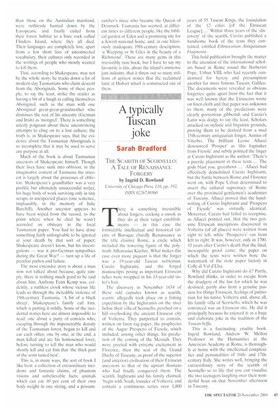Very down under
Philip Hensher
IN TASMANIA by Nicholas Shakespeare
Hari/1, £20, pp. 374, ISBN 1843431572 08 (plus £2.25 p&p) 0870 800 4848
0 ne of the things which drew Nicholas Shakespeare to Tasmania was that it was one of the few remote places that Bruce Chatwin, whom he'd spent seven years writing a biography about, had never been to. But Shakespeare has written a wonderfully Chatwinesque book about a place, in which individual historical narratives are woven in with the writer's own research and encounters. Shakespeare doesn't have the faint smugness of Chatwin, and the book, though containing a good deal of his own family history, is much more self-effacing; but it is just as inquisitive, and has the same energetic enjoyment of fantastically abstruse local detail, and a sheer love of story-telling.
Tasmania is a very odd place. As Shakespeare says, the ugly stereotypes which the rest of the world use about Australians are rather the same as the stereotypes Australians use about Tasmanians. (The subjects of the Tasmanians' ridicule can only be guessed at.) It gives the impression of being a place with no history; nothing between the suburban gentility, prudery and embarrassingly named bungalows, on the one hand, and the dumb, primeval antiquity of its geography.
That blankness and remoteness have made it a favourite place to escape into; there are (predictably) sightings of Lord Lucan there. As an Australian joke of ten years back had it. 'What's blonde, has big tits and lives in Tasmania? A: Salman Rushdie.' It is a place, too, where much of its history has been erased; the Aboriginals long dead, the Tasmanian tiger assumed to be extinct. Much of its history must be pursued through fugitive sightings, like those natives who recently insist that they have seen a live Tasmanian tiger (it often turns out to be a brindled greyhound). Shakespeare, himself escaping there, has written a book about glimpses and rumours, about vanished and unrecorded cultures, about figures deliberately forgotten.
The one thing everyone knows, or thinks they know, about Tasmania, is that its aboriginal peoples, far more violent and hostile than those on the Australian mainland, were ruthlessly hunted down by the Europeans, and finally exiled from their forest habitat to a bare rock called Hinders Island, where they all died. Their languages are completely lost, apart from a few short lists of unconnected vocabulary, their cultures only recorded in the writings of people who mostly wanted to kill them.
That, according to Shakespeare, may not be the whole story; he tracks down a lot of modern-day Tasmanians who claim descent from the Aboriginals. Some of these people, to say the least, strike the reader as having a bit of a laugh in calling themselves Aboriginal, such as the man with one Aboriginal great-great-grandmother who dismisses the rest of his ancestry (German and Irish) as 'mongrel'. There is something utterly poignant about these unconvincing attempts to cling on to a lost culture; the truth is, as Shakespeare says, that the evidence about the Tasmanian Aboriginals is so incomplete that it may be used to serve any purpose at all, Much of the book is about Tasmanian ancestors of Shakespeare himself. Though their lives have sunk into oblivion, in the imaginative context of Tasmania the interest is largely about the processes of oblivion. Shakespeare's grandfather was a very prolific but ultimately unsuccessful writer, his huge body of work surviving only in tiny scraps, in unexpected places (one sentence, implausibly, in the memory of Julie Burchill). Another ancestor appears to have been wiped from the record, to the point where when he died he wasn't accorded an obituary in the local Tasmanian paper. You had to have clone something fairly unforgivable to be ignored at your death by that sort of paper; Shakespeare doesn't know, but his investigations — was it pro-German sympathies during the Great War? — turn up a life of peculiar pathos and failure.
The most extensive story is about a man now not talked about because, quite simply, there is nothing much good to be said about him. Anthony Fenn Kemp was, evidently, a ruthless crook whose vicious life leads us through the incredible violence of 19th-century Tasmania. 'A bit of a black sheep', Shakespeare's family call him, which is putting it mildly. Some of the incidental stories here are almost impossible to read; one about a party of convicts who, escaping through the impenetrable density of the Tasmanian forest, began to kill and eat each other, one by one; at the end, a man killed and ate his homosexual lover, before turning to tell the man who would shortly kill and eat him that 'the thick part of the arms tasted best'.
This is, in many ways, the sort of book I like best; a collection of extraordinary incidents and fantastic claims, of phantom visions and unbelievable facts; animals which can eat 40 per cent of their own body weight in one sitting, and a possum
catcher's niece who became the Queen of Denmark. Tasmania has seemed, at different times to different people, like the biblical garden of Eden and a promising site for a Jewish national home, and, in one hilariously inadequate 19th-century description, 'a Wapping or St Giles in the beauty of a Richmond'. There are many gems in this irresistibly rum book, but I have to say my favourite is this, about the island's immense jam industry: that it threw out so many millions of apricot stones that the reclaimed land at Hobart wharf is constructed out of them.



























































































 Previous page
Previous page